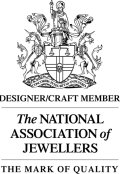Ethical Handmade Jewellery and Our Materials
I try to use only ethical materials when hand crafting bespoke jewellery, but it is a contentious topic; generally just like "Welsh gold" you need to have great faith in the suppliers of such materials - as there are no official standards, no absolute certainty.
In General Terms
As there are no de-jure standards which suppliers and customers can really count on in the jewellery field to certify the ethical nature of the materials in use (like those provided by the Fair Trade organisation), trust in suppliers and supply chains is really the only limiting factor for all makers. Even though I have trust in my suppliers (most of very long standing), there is really no concrete guarantee that somewhere along their collective supply-chain's there have been no lapses with respect to the sourcing.
The Best Way Forward
The simplest way to ensure nobody has been exploited in the sourcing or supply of your custom made jewellery - is to supply something of "known provenance" for me to recycle into something new for you.By recycling, you can be assured that the jewellery you recieve is created totally ethically, and nobody is disadvantaged or exploited in the process. However, even then we have no knowledge of where the materials were originally sourced.
Mining
Different mines in different geographical locations use different methods to obtain the raw materials from which the precious metals are refined. Additionally, different refinement methods are used - some of which are more 'more modern' than others. To my knowledge I only use precious stones and metals supplied by 'considerate' companies who carry full ISO 14000 accredditations - in particular ISO 14001 and ISO 14004, which prescribe stringent guidelines ensuring companies use good environmental management practices.
Across the board, production of precious metals (gold, silver, platinum), and precious stones is really big business - and the lions share of the new material in the markets has been almost certainly ethically "produced". But black markets do exist, so be wary when shopping particularly abroad.
I have recently bought some pink sapphires and spinels from a company called Rubyfair which has close connections with a ruby mine in Tanzanire which mines ethically and the stones are not treated to enhance their colour but almost inevitably they are more expensive.
Metals
All of the precious metals in the field (whether minerals or chemical elements) are obtained initially from traditional mining processes. Nasty chemicals (for example Cyanide) are sometimes used to aid in the Extraction of the gold from the raw materials.
There is a wealth of information about gold mining elsewhere on the web, in particular wikipedia's gold mining section is recommended.
Stones
Just like mining metals, precious and semi-precious stones are or were all mined at some point (more and more are harvested from the sea floor in recent years). To an extent there is more "active recycling" going on in precious stone markets. I do not and will not work with conflict diamonds.
Making and Cleaning
From the time the raw materials arrive on a jewellers bench, further scope for ethical lapses arise when items are actually being made. A low quantity, but varied array of potentially hazardous chemicals are used for shaping, refining, connecting and cleaning the metals.
There are many facets to ethical jewellery making, and I always try my best to satisfy even the most active conscience, if you have any specific concerns please do not hesitate to contact me.

